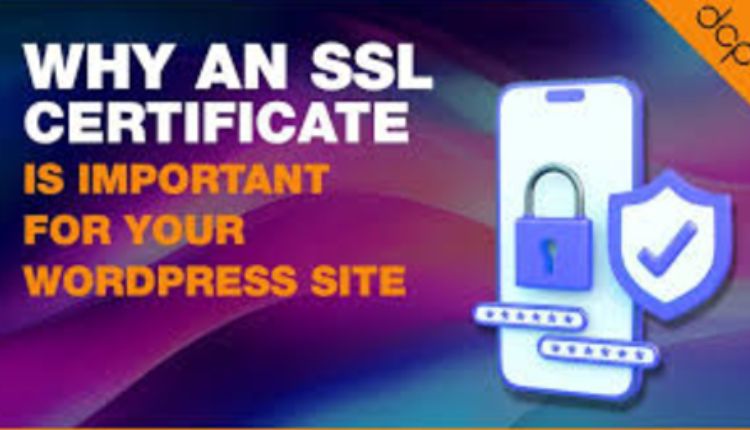In today’s digital landscape, maintaining a secure and trustworthy online presence is essential for any business or individual. One critical component of online security is the SSL certificate for your website. This often-overlooked element can significantly impact your website’s security, user trust, and search engine rankings. In this article, we’ll explore what SSL certificates are, why they are vital for your website, and how to choose the right one for your needs.
What is an SSL Certificate?
SSL (Secure Sockets Layer) is a technology that encrypts the data exchanged between a user’s browser and a website. An SSL certificate for a website ensures that any sensitive information, such as passwords, credit card numbers, or personal details, is transmitted securely, protecting it from cybercriminals and hackers.
When a website has an SSL certificate, its URL begins with https:// instead of http://, and users often see a padlock icon in their browser’s address bar. This small but crucial detail signals to visitors that your site is secure.
Why Your Website Needs an SSL Certificate
- Protect Sensitive Data
If your website collects sensitive information, such as login credentials or payment details, an SSL certificate is non-negotiable. Encryption provided by SSL ensures that this data remains secure and cannot be intercepted by malicious actors.
- Build User Trust
Visitors are more likely to trust a website with an SSL certificate. The padlock icon and “https” protocol reassure them that their data is safe, encouraging them to interact with your site. Without an SSL certificate, users might see warnings like “Not Secure,” which can deter them from proceeding.
- SEO Benefits
Search engines like Google prioritize secure websites in their rankings. In fact, Google explicitly states that SSL certificates are a ranking factor. Having an SSL certificate for your website can give you a competitive edge by improving your search engine visibility.
- Regulatory Compliance
Many industries require websites to use SSL certificates to comply with data protection regulations such as GDPR, HIPAA, and PCI DSS. Failing to implement SSL can result in hefty fines and reputational damage.
- Safeguard Against Cyber Threats
Cyber threats like phishing and man-in-the-middle attacks are becoming increasingly sophisticated. An SSL certificate provides a crucial layer of protection, making your website less vulnerable to such threats.
Types of SSL Certificates
When choosing an SSL certificate for your website, it’s essential to understand the options available:
- Domain Validation (DV)
- Verifies domain ownership.
- Basic level of encryption.
- Suitable for blogs or personal websites.
- Organization Validation (OV)
- Verifies both domain ownership and organization details.
- Provides higher trust levels.
- Ideal for small businesses.
- Extended Validation (EV)
- Provides the highest level of validation and displays the organization name in the browser’s address bar.
- Recommended for e-commerce and financial websites.
- Wildcard SSL Certificate
- Secures a domain and all its subdomains.
- Cost-effective for websites with multiple subdomains.
- Multi-Domain SSL Certificate
- Secures multiple domain names under a single certificate.
- Useful for businesses managing several websites.
How to Obtain an SSL Certificate for Your Website
Step 1: Choose a Certificate Authority (CA)
A trusted Certificate Authority (CA) issues SSL certificates. Popular CAs include Let’s Encrypt, DigiCert, and Comodo.
Step 2: Select the Right Type of SSL Certificate
Consider your website’s requirements. For example, an e-commerce site may need an EV SSL certificate, while a blog might only require a DV SSL certificate.
Step 3: Install the SSL Certificate
Most hosting providers offer free SSL certificates and automatic installation. If manual installation is needed, follow your web host’s instructions or seek professional assistance.
Step 4: Test Your Website
After installation, test your website to ensure it displays the “https” protocol and padlock icon. Tools like SSL Labs can help verify proper configuration.
Common Misconceptions About SSL Certificates
- “Free SSL certificates aren’t secure.”
Free SSL certificates, like those from Let’s Encrypt, provide robust encryption. However, they often lack additional features like extended validation. - “SSL certificates slow down websites.”
Modern SSL certificates use efficient encryption protocols that have minimal impact on website speed. - “SSL is only for e-commerce websites.”
SSL is essential for all websites, regardless of their purpose. Search engines and users expect secure connections across the board.
Also Read : Yearlymagazine
Conclusion
An SSL certificate for your website is no longer optional—it’s a necessity. It protects your visitors’ data, builds trust, improves SEO, and ensures compliance with legal standards. By investing in the right SSL certificate and keeping it updated, you can secure your online presence and position your website for long-term success.






